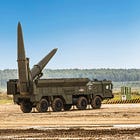Nukes may spread if Trump ditches NATO
Why are Europeans looking for nukes of their own?
Good morning – here is your Saturday newsletter. Welcome to our new paid subscribers!
In peace,
Steve
There is an old saying that the purpose of NATO, the trans-Atlantic military alliance formed after the Second World War, was to, “keep the Germans down, the Americans in, and the Russians out.”
But President Donald Trump is changing all of that.
Trump’s dramatic realignment of the United States away from European members of NATO, and closer to Russia, has allies reeling.
Nowhere is the shift more evident than the U.S. President’s apparent adoption of Russian President Putin’s view of the invasion of Ukraine (that is, Ukraine’s to blame for the war), leaving his NATO allies scrambling to fill the gap in support for Ukraine left by the U.S.
The uncertainty over the stability of alliance between the U.S. and Europe has resulted in some countries expressing a desire to acquire nuclear weapons of their own, rather than relying on the U.S. for protection through NATO.
This means that the world could be poised for rapid nuclear proliferation of the number of weapons, and the number of countries where they are based.
NATO members looking for new nuclear options
NATO puts nuclear weapons at the core of its military policy, stating, “As long as nuclear weapons exist, NATO will remain a nuclear alliance.” Even Canada sits on NATO’s “Nuclear Planning Group” as a member, even though we don’t have nuclear weapons.
Three NATO members have nuclear arsenals, and they make them available to NATO should any member country come under attack:
The United States (3,700 warheads; land, sea, and air-launched)
France (290 warheads, sea and air-launched)
The United Kingdom (225 warheads; sea-launched only)
In addition, the United States deploys nuclear weapons in five other NATO countries: The Netherlands, Belgium, Germany, Türkiye and Italy.
As PeaceQuest readers will know, the Biden administration rushed more advanced nuclear weapons to these foreign bases following the Russian invasion of Ukraine.
Russia responded by deploying weapons of its own to its close ally, Belarus.
Who wants access to nuclear weapons?
Three national leaders have expressed interest in gaining access to nuclear weapons in recent days.





